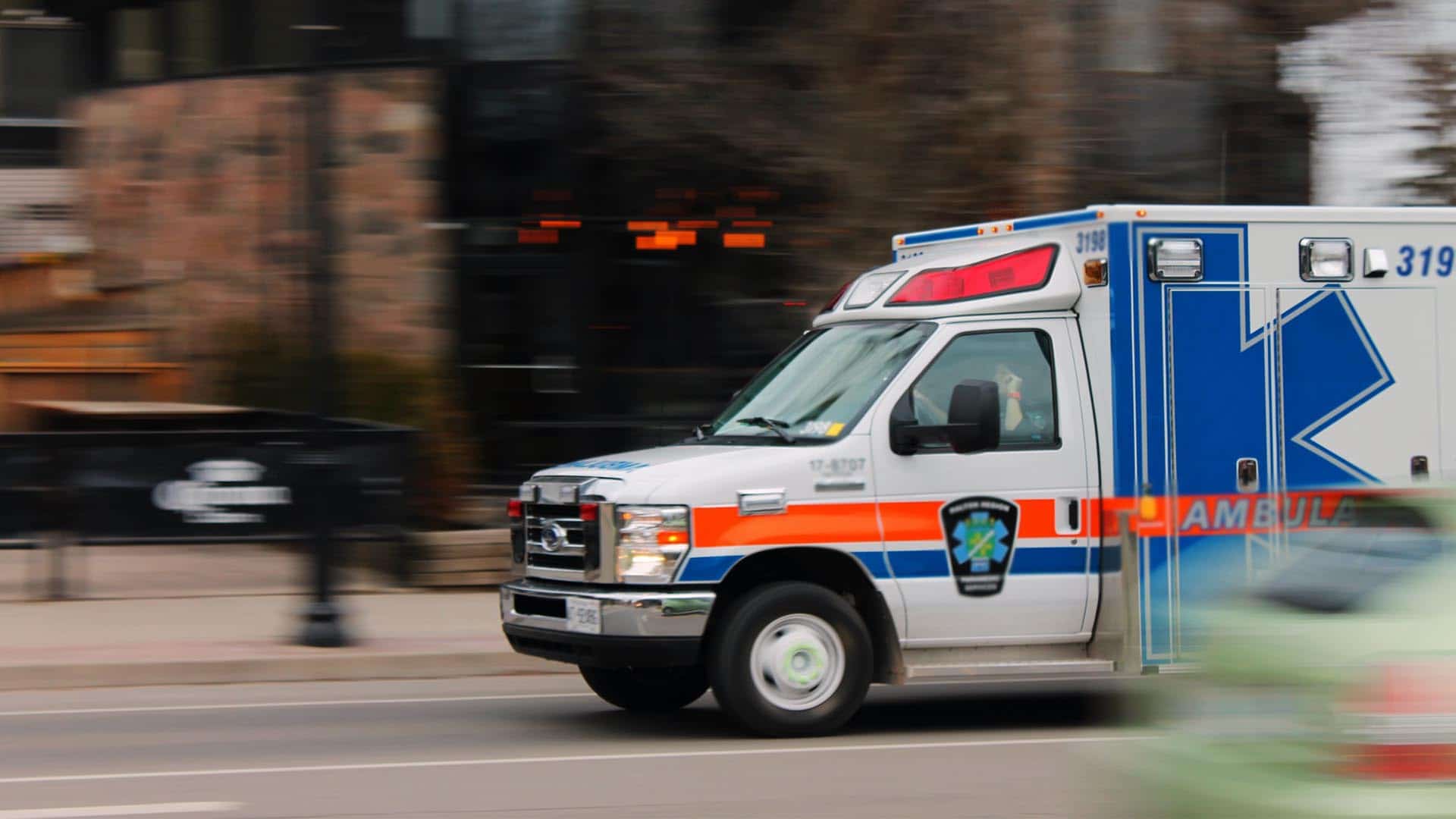What To Do When A Loved One Is Taken By Ambulance To A Trauma Centre After An Accident
Author(s): Darcy R. Merkur
May 27, 2021

There is nothing more frightening than receiving a call from the police advising you that a loved one has been taken to the hospital by ambulance with serious injuries after a car accident or slip and fall. All sorts of thoughts will go through your head and there are many things that need to be done to deal with the traumatic situation.
This blog post is meant to take you through some of the common events that occur following a serious car accident or slip and fall.
Will my loved one go to a local hospital or trauma hospital?
If your loved one has suffered a brain injury, spinal cord injury, or various other serious injuries like fractures, then the ambulance might initially take them to a local hospital, but they will quickly be transitioned and transferred to a major trauma hospital in the Greater Toronto Area or elsewhere in Ontario.
Specifically, almost all seriously injured motorists near the Greater Toronto Area including pedestrians hit by vehicles or bicyclists struck by cars end up at the main trauma centers Sunnybrook Hospital or St. Mike’s Hospital. Seriously injured children are taken to SickKids Hospital in Toronto.
Outside of Toronto, an accident victim requiring a trauma hospital will be taken to the Hamilton General Hospital, Windsor Regional Hospital or Ottawa Hospital, and for injured children outside the Greater Toronto Area, they will be usually admitted to the Children’s Hospital of Eastern Ontario.
What happens when my loved one arrives at a Trauma Center?
Once admitted to a trauma hospital, the accident victim will often start in the critical care unit or in the intensive care unit. Often an induced coma is required to stabilize the person’s injuries and to allow for other medical procedures aimed at decreasing the damage caused by swelling of the brain injury inside the skull.
Will I be able to visit my loved one after they are admitted to a Trauma Hospital?
While loved ones are often able to attend at the hospital, they are typically prevented from speaking to their injured loved one until the initial crisis period has stabilized.
Car accident victims have no-fault accident benefit claims through their car insurer that will allow them to recover all of the expenses associated with visiting their loved one at the hospital.
Accordingly, immediate family members should keep all receipts associated with travel to, parking at, accommodations near and even meals associated with visiting a loved one while they are in the hospital following a serious car accident.
What happens after my loved one is discharged from the Trauma Centre?
Once the accident victim’s injuries stabilize, and any initial surgery needs have been addressed, the accident victim is typically discharged to a rehabilitation hospital.
It is crucial that family members encourage their loved one to go through the hospital rehabilitation process for a number of reasons. Most importantly, the medical advice you will be given will recommend doing so. In addition, OHIP provides coverage for all hospital related expenses even where a lawsuit (a tort claim) is available against the at-fault drivers who caused the accident and even where a catastrophic impairment accident benefit claim is expected. There is often not enough funds to go around such that it is best to access the OHIP funded system to as great an extent as possible.
Typically, those who have suffered brain injuries end up at one of three hospitals near Toronto, namely: the Toronto Rehabilitation Institute, Bridgepoint Hospital or West Park Hospital.
Outside Toronto, accident victims regularly end up at the Hamilton Rehabilitation Hospital, Windsor Regional Rehabilitation Hospital or Ottawa Hospital Rehabilitation Centre. When it comes to children suffering brain injuries, they will notoriously end up at Holland Bloorview Kids Rehabilitation or in Ottawa at the Children’s Treatment Center.
When you are dealing with serious orthopaedic injuries or a spinal cord injury the rehabilitation hospitals are somewhat different.
Toronto Rehabilitation Institute has a wonderful program for those suffering musculoskeletal injuries while those sustaining serious spinal cord injuries like quadriplegia or paraplegia typically end up at Lyndhurst Hospital.
How long will my loved one stay at the rehabilitation hospital?
The length of stay at the rehabilitation hospital varies depending on the person’s recovery.
The rehabilitation program is typically four to twelve weeks long although spinal cord injury situations usually last much longer than that.
The services and treatment your loved one would get at a rehabilitation hospital are multifaceted and typically include speech-language pathology, occupational therapy, social work assistance, nursing assistance and physiotherapy.
When the patient is ready to be discharged, then they will need a private rehabilitation team able to assist them. The private team will have to be paid by an insurer.
What happens after my loved one is discharged from a rehabilitation hospital?
Where the person has been in a car accident and has accident benefit rights, they should have all of their private care needs addressed by their no-fault accident benefit insurer. Speaking to a qualified trauma lawyer is a good decision when you are dealing with serious injuries as they can help explain the accident benefit process to you and can make sure that all of the claims available to you are advanced.
Where a catastrophic impairment is expected, the services of a private case manager can be coordinated to help plan for the private rehabilitation post-discharge from the hospital.
Before you are discharged from hospital you may need an occupational therapist to inspect your home and to help coordinate the equipment you may require for a safe discharge.
While the no-fault accident benefits system provides the ability for accident victims to access private treatment at the expense of their car insurer, where no fault benefits are not available (because you were not injured in a car accident, for example) then you may be able to sue the parties responsible for the accident for all of these costs.
Consult with a personal injury lawyer or trauma lawyer to help you determine whether or not you have somebody to sue for your injuries and the extent of compensation that may be available.
Compensation in a lawsuit can cover your income loss, your pain and suffering and all of your future care needs.
If you have been hurt in a car accident or you get that call about a loved one being hurt, reach out for help from those who have been down that path before. Speaking with an experienced trauma lawyer will help you understand what to expect and they should help give you hope since most good personal injury lawyers have helped people make excellent recoveries from their serious injuries.
Thomson Rogers offers free consultations so please feel free to reach out to us at any time. We are here to help.
Darcy Merkur is a highly regarded Ontario trauma lawyer helping accident victims such as pedestrians, cyclists and motorists, who have sustained catastrophic injuries.
Darcy is the first lawyer in Canada to be qualified as a Certified Brain Injury Specialist by the Brain Injury Association of America. In addition, Darcy has been recognized as a Certified Specialist in Civil Litigation by the Law Society of Ontario, is listed in peer-reviewed publications – Lexpert® and The Best Lawyers™ in Canada, is ranked AV pre-eminent in Martindale-Hubbell ® and is a partner at Thomson Rogers, one of Canada’s Top 10 Personal Injury Law Firms as selected by Canadian Lawyer Magazine.
Darcy can be reached at 416-868-3176 or by EMAIL.
For Thomson Rogers updates please subscribe to our email list here.
Share this





